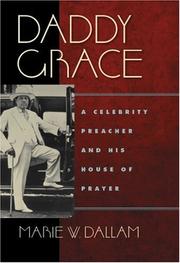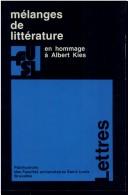| Listing 1 - 3 of 3 |
Sort by
|
Book
ISBN: 2956648071 Year: 2021 Publisher: Champs sur Marne : LISAA éditeur,
Abstract | Keywords | Export | Availability | Bookmark
 Loading...
Loading...Choose an application
- Reference Manager
- EndNote
- RefWorks (Direct export to RefWorks)
La Révolution française a mis fin non seulement à une forme de vie politique et sociale, mais aussi à une littérature. Le début du XIXe siècle signe la fin des belles-lettres classiques et l’avènement de la littérature que la critique moderne, en écho au vers célèbre de Victor Hugo, a longtemps crue en guerre contre la rhétorique. Cet ouvrage se propose de réexaminer la place de l’art oratoire dans la théorie et la pratique littéraires de Charles Nodier, théoricien de l’éloquence romantique, et des écrivains de son salon littéraire de la Bibliothèque de l’Arsenal. L’analyse des œuvres de Nodier, Hugo, Musset et Vigny permet de saisir le passage de la rhétorique classique à l’éloquence romantique qui ouvre la voie à la modernité littéraire.
History --- Literature (General) --- éloquence --- romantisme --- Arsenal --- style --- littérary style --- romantics --- Nodier, Charles, --- Criticism and interpretation. --- Bibliothèque de l'Arsenal. --- Néophobus --- Nodier, Jean Charles Emmanuel, --- Paris.

ISBN: 0814785131 0814720234 9780814720233 9780814720103 0814720102 9780814720370 0814720374 9780814785133 Year: 2007 Publisher: New York : New York University Press,
Abstract | Keywords | Export | Availability | Bookmark
 Loading...
Loading...Choose an application
- Reference Manager
- EndNote
- RefWorks (Direct export to RefWorks)
Charles Manuel “Sweet Daddy” Grace founded the United House of Prayer for All People in Wareham, Massachusetts, in 1919. This charismatic church has been regarded as one of the most extreme Pentecostal sects in the country. In addition to attention-getting maneuvers such as wearing purple suits with glitzy jewelry, purchasing high profile real estate, and conducting baptisms in city streets with a fire hose, the flamboyant Grace reputedly accepted massive donations from his poverty-stricken followers and used the money to live lavishly. It was assumed by many that Grace was the charismatic glue that held his church together, and that once he was gone the institution would disintegrate. Instead, following his 1960 death there was a period of confusion, restructuring, and streamlining. Today the House of Prayer remains an active church with a national membership in the tens of thousands.Daddy Grace: A Celebrity Preacher and His House of Prayer seriously examines the religious nature of the House of Prayer, the dimensions of Grace’s leadership strategies, and the connections between his often ostentatious acts and the intentional infrastructure of the House of Prayer. Furthermore, woven through the text are analyses of the race, class, and gender issues manifest in the House of Prayer structure under Grace’s aegis.Marie W. Dallam here offers both a religious history of the House of Prayer as an institution and an intellectual history of its colorful and enigmatic leader.
RELIGION / Christianity / Pentecostal & Charismatic. --- Grace, --- Daddy Grace, --- Grace, Charles Emmanuel, --- United House of Prayer for All People. --- House of Prayer --- HOP --- House of Prayer for All People --- United House of Prayer for All People, Church on the Rock of the Apostolic Faith --- United House of Prayer for All People on the Rock of the Apostolic Faith --- Church on the Rock of the Apostolic Faith

ISBN: 280280037X 2802803905 9782802800378 Year: 1985 Volume: 34 Publisher: Bruxelles : FUSL,
Abstract | Keywords | Export | Availability | Bookmark
 Loading...
Loading...Choose an application
- Reference Manager
- EndNote
- RefWorks (Direct export to RefWorks)
Ce volume, composé pour Albert Kies à l’occasion de son admission à l'éméritat, tente - selon la coutume - de rencontrer les préoccupations de celui à qui ses collègues et amis ont voulu rendre hommage. On y trouvera donc des contributions d’histoire littéraire, de littérature comparée et de critique, et particulièrement deux ensembles d’études sur les écrivains auxquels Albert Kies consacre le meilleur de lui-même : Baudelaire et Nodier. Le bibliophile n’a pas non plus été oublié.
Sociology of literature --- Old French literature --- Baudelaire, Charles --- Nodier, Charles --- Huldeboeken --- Kies, A. --- Letterkunde --- Littérature --- Mélanges --- French literature --- Littérature française --- History and criticism --- Histoire et critique --- Nodier, Charles, --- Baudelaire, Charles, --- Kies, Albert, --- Criticism and interpretation --- --mélanges --- --Kies, Albert --- 1437 --- Criticism and interpretation. --- -History and criticism --- -Baudelaire, Charles --- -Kies, Albert --- Festschrift - Libri Amicorum --- History and criticism. --- Littérature française --- Néophobus --- Baudelaire-Dufaÿs, Charles Pierre, --- Bodler, Sharlʹ, --- Бодлер, Шарль, --- Būdlīr, --- Baudelaire, Charles Pierre, --- Baudelaire, Pierre Charles, --- Dufaÿs, Charles Pierre Baudelaire-, --- Bodler, Shara, --- Bodler, Şarl, --- Śārla Bodaleẏāra, --- Bodaleẏāra, Śārla, --- Bōntlair, K., --- Bodlir, Sharl, --- Bodler, Sh. --- Bōdorēru, Sharuru, --- Μπωντλαίρ, Σαρλ, --- באדלער, טש --- בודליר, שארל, --- בודליר, שר̀ל --- בודלר, שארל, --- בודלר, שרל, --- بودلير, شارل, --- ボードレールシャルル, --- --Kies, Albert, --- בודליר, שרל --- Baudelaire, Charles Pierre --- Baudelaire, Charles. --- Baudelaire, Ch. --- Baudelaire-Dufaÿs, Charles Pierre --- Bodler --- Bodler, Sharlʹ --- Бодлер, Шарль --- Būdlīr --- Baudelaire, Pierre Charles --- Dufaÿs, Charles Pierre Baudelaire --- -Bodler, Shara --- Bodler, Şarl --- Śārla Bodaleẏāra --- Bodaleẏāra, Śārla --- Bōntlair, K. --- Bodlir, Sharl --- Bōdorēru, Sharuru --- C. B., --- B., C., --- Kies, Albert --- Nodier, Jean Charles Emmanuel, --- analyse littéraire --- histoire --- poésie --- conte --- romancier --- roman --- littérature --- portrait --- bibliophilie --- Kies, Albert, 1915-1998 --- Nodier, Charles, - 1780-1844 --- Baudelaire, Charles, - 1821-1867 --- Kies, Albert, - 1915 --- -French literature --- -Sociology of literature
| Listing 1 - 3 of 3 |
Sort by
|

 Search
Search Feedback
Feedback About UniCat
About UniCat  Help
Help News
News